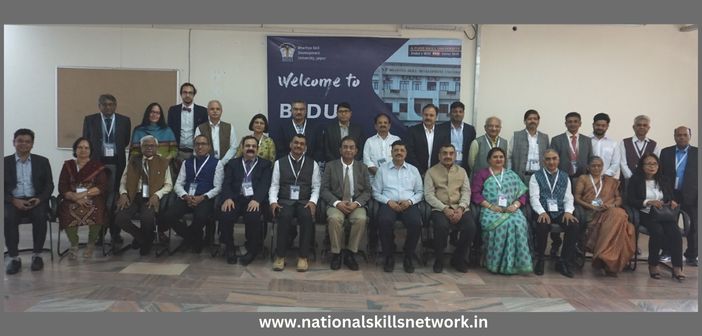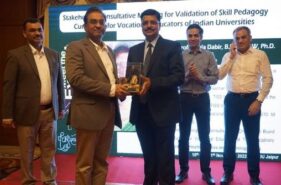The mandate for implementing work-integrated higher education courses in India heralds a new approach to teacher education in the vocational space. The fact that vocational higher education is different from general education is yet to gain ground since we are in the process of streamlining the curriculum and the pedagogy for HEI offering different types of short and long term courses that prepare students for the new world of work.
Today, vocational higher education courses such as B.Voc, M.Voc, BBA offered by many skill universities and other degree courses integrated with vocational components need teachers and trainers who are well-versed in vocational pedagogy and equipped with multiple competencies. This is imperative to bridge the gap between domain knowledge and expertise (pertaining to an industry segment) and pedagogical skills and appropriate teaching methodology to design and deliver the courses.
In the backdrop of the emerging changes and new opportunities in the Indian Universities offering vocational courses, Bhartiya Skill Development University (BSDU) Jaipur in collaboration with Commonwealth Educational Media Centre for Asia (CEMCA), organized a 2-day consultative meeting at Jaipur on the 10th and 11th November 2022. The objective of the meeting was to validate and enhance the curriculum and pedagogy for vocational educators of higher education that could be developed an open courseware that prepares the teachers to make a transition to vocational education.
The proceedings were conducted by Dr. Rajdeep Deb, Principal, School of Entrepreneurship Skills, BSDU, and Mr. Saurabh Mishra, Programme Officer, CEMCA.
Dr B. Shadrach – Director CEMCA and Dr Sandeep Kumar Tomar – Registrar, BSDU initiated the discussions on various aspects of the curriculum and the need for an online learning module in vocational teacher education in Indian universities. The inaugural session was graced by Mr. Jayant Joshi, Chief Functionary, RUJCT, sponsoring body of BSDU Jaipur.

With high-level guidance from Dr Stephen Billet, Professor, School of Education and Professional Studies, Griffith University, the draft curriculum was reviewed by the following experts representing different higher education institutions and organizations in India.
- Dr Avani Umatt – I/C Provost, TeamLease Skills University
- Dr. Akali Sema – Professor, School of Agricultural Sciences Rural Development, Nagaland University
- Dr Parul Bhatnagar – Emeritus Professor, Business Incubator Manager, Head Technical Training, – Dayalbagh Educational Institute
- Dr. Anirban Ghosh, Director, School of Vocational Education, NSOU
- Dr. Chandrabhanu Pattanayak, Director, Institute of Knowledge Society
- Dr Neela Dabir – Retd Deputy Director, TISS SVE
- Dr Anil M Bisen – Provost, ITM Vocational University
- Dr. M. Radha Krishna – In-chart CART, Vocational Training Center
- 9. Dr Rana S Pratap Singh – Director, School of Vocational Education and Training (SOVET) IGNOU
- Dr D V Rama Koti Reddy, Executive Director, APSSDC
- Dr Vinay Mehrotra, Professor, PSSCIVE, Bhopal
- Mr. Kailash Chaudhary, General Manager, Regional Business Vertical Head, CBRE
- Dr. Randhir Singh Rathore, Registrar, SVSU
- Dr. Madhuri Dubey, Founder, National Skills Network – NSN
- Mr. Kartikeya Anand, OSD to Minister of Finance and Skills, Government of Andhra Pradesh
- Dr. Neeraj Gupta, Director DDUKK, Central University of Rajasthan
- Ms. Charu Babbar – Lead – Learning Design and Development – Tata STRIVE
- Dr Jagadish Nath – Skill Manager (Service Sector), Assam Skill University
- Dr Nandita Choudhury, Professor, BML Munjal University
While reviewing the curriculum and pedagogy the experts deliberated on a host of issues such as:
- Preparing to teach vocational subjects at the higher education level that offers flexible Degree courses in a work-integrated format
- Motivation and drive to be in vocational higher education as a teacher/ facilitator
- Pedagogical differences between general education and vocational education and the need to adapt teaching methods to suit the learners’ styles and the context of learning
- Awareness about NSQF levels, NCVET approved curriculum in the form of QP-NOS
- Innovative interventions in sensitizing vocational educators about Instructional Design, how to appreciate design even though their job is to deliver the course
- Method of presenting the teacher education course content- scenario based learning, case studies, application of information, being learner centric, learning outcomes, learning styles
- Defining learning outcomes and working towards achieving them through appropriate teaching methodology
- Transitioning from being a traditional teacher to a vocational facilitator and the competencies needed therein
- Using digital tools and technology, being adept, and confident in applying online or blended learning methodology
- Access to learning resources for continuous professional development
 The deliberations on Day-1 was concluded with the felicitation ceremony of the experts and networking dinner organized by CEMCA and BSDU Jaipur.
The deliberations on Day-1 was concluded with the felicitation ceremony of the experts and networking dinner organized by CEMCA and BSDU Jaipur.
The 2-Day stakeholder meeting concluded with a few critical action items to incorporate the suggestions from the experts and create an online course of appropriate duration.
Also read: A two-day consultation meeting on Model Curriculum for the Training of Vocational Educators will be held by CEMCA and BSDU https://nationalskillsnetwork.in/a-two-day-consultation-meeting-on-model-curriculum-for-the-training-of-vocational-educators-will-be-held-by-cemca-and-bsdu/
Post- meeting the participants had an opportunity to explore the BSDU campus, particularly the state-of-the-art facilities for practical training in Manufacturing, Healthcare, Hospitality, Wood Engineering, Robotics and more.













